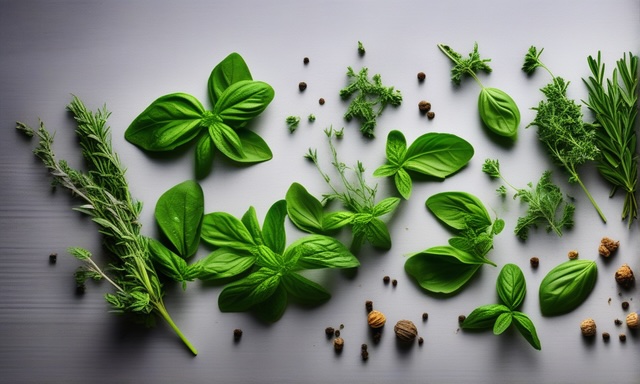Internet Asks: "Herbs High in Vitamin C"
When we think of Vitamin C, our minds often jump to citrus fruits like oranges and lemons. However, the plant kingdom offers another rich source of this essential nutrient: herbs. Surprisingly potent and packed with Vitamin C, these green marvels not only add flavor to our dishes but also contribute significantly to our daily nutritional needs. Let's explore some of the top herbs renowned for their high Vitamin C content.
sponsored links

Understanding Vitamin C's Role
Vitamin C, or ascorbic acid, is a powerhouse of health benefits. It's crucial for the growth, development, and repair of body tissues. Its roles include collagen formation, iron absorption, immune system strengthening, wound healing, and the maintenance of cartilage, bones, and teeth. The antioxidant properties of Vitamin C also help combat free radicals, reducing inflammation and lowering the risk of chronic diseases.
Herbs Rich in Vitamin C
-
- Parsley: Often used as a garnish, parsley is more than just a decorative touch. It's a vitamin C powerhouse, with just a half-cup providing over 50% of the daily recommended intake. Parsley is also rich in flavonoids and other antioxidants, making it a healthful addition to any dish.
-
- Thyme: Known for its distinctive flavor, thyme is also a significant source of vitamin C. It's a versatile herb that can be used in various culinary creations, from soups and stews to baked goods.
-
- Coriander (Cilantro): Both the seeds (coriander) and the leaves (cilantro) of this herb are high in vitamin C. Coriander is commonly used in global cuisines, from Indian curries to Mexican salsas, adding a burst of flavor and a dose of health benefits.
-
- Chives: These delicate, onion-flavored herbs are not only a great topping for baked potatoes or salads but also a good source of vitamin C. Chives add a subtle depth to dishes while boosting their nutritional content.
-
- Kale: While not traditionally considered an herb, kale is often used in culinary applications similar to herbs and is exceptionally high in vitamin C. It can be added to salads, smoothies, and even baked into chips for a crunchy snack.
- Peppermint: This refreshing herb contains about 31.8mg of Vitamin C per 100g. It's not only a great addition to teas but can also be used in salads and desserts.
sponsored links
Incorporating Vitamin C-rich Herbs into Your Diet
- - Fresh is Best: Whenever possible, use fresh herbs to maximize the Vitamin C content, as drying can reduce vitamin levels.
- - Herb-Infused Water: Add fresh mint, parsley, or thyme to your water for a refreshing twist and a vitamin boost.
- - Cooking: Incorporate these herbs into your cooking, from garnishes to main ingredients in sauces and soups.
- - Herbal Teas: Enjoy the benefits of these herbs in the form of herbal teas. Peppermint tea, for example, can be a soothing, vitamin-rich beverage.
Benefits Beyond Vitamin C
Herbs high in Vitamin C also contain other beneficial compounds, such as flavonoids and essential oils, contributing to their anti-inflammatory, antimicrobial, and antioxidant properties. Incorporating these herbs into your diet can support overall health beyond just providing Vitamin C.
Conclusion
Herbs high in Vitamin C are an excellent way to enhance your meals not only with vibrant flavors but also with a significant nutritional boost. Incorporating these herbs into your daily diet can contribute to meeting your Vitamin C requirements, supporting overall health and wellness. So next time you're in the kitchen, reach for some parsley, thyme, or cilantro, and give your meal a nutritious upgrade.
Disclaimer: This article is for informational purposes only. Always consult with a healthcare professional before making significant changes to your diet, especially if you have health conditions or dietary restrictions.
sponsored links
References
1. NDTV Food. 7 Vitamin C-Rich Drinks To Boost Immunity. https://food.ndtv.com/photos/immunity-7-vitamin-c-rich-drinks-to-boost-immunity-100271
2. Goldman Laboratories. What are the best sources of Vitamin C. https://www.goldmanlaboratories.com/en/blog/what-are-the-best-sources-of-vitamin-c-n21
3. USDA FoodData Central. https://fdc.nal.usda.gov/
4. Harvard T.H. Chan School of Public Health. Vitamin C. https://www.hsph.harvard.edu/nutritionsource/vitamin-c/
5. National Institutes of Health (NIH). Vitamin C Fact Sheet. https://ods.od.nih.gov/factsheets/VitaminC-HealthProfessional/
6. Bagamboula CF, Uyttendaele M, Debevere J. Inhibitory effect of thyme and basil essential oils, carvacrol, thymol, estragol, linalool and p-cymene towards Shigella sonnei and S. flexneri. Food Microbiol. 2004 Feb 1;21(1):33–42.
7. Netmeds. Chives: The Astonishing Health Benefits Of This Nutrient-Dense Vegetable. https://www.netmeds.com/health-library/post/chives-the-astonishing-health-benefits-of-this-nutrient-dense-vegetable#:~:text=Chives%20are%20rich%20in%20vitamin,fats%20for%20accelerating%20weight%20loss.
8. Healthline. Parsley vs. Cilantro: What's the Difference? https://www.healthline.com/nutrition/parsley-vs-cilantro
9. WebMD. Top Foods High in Vitamin C. https://www.webmd.com/diet/foods-high-in-vitamin-c
People are also reading...
Calories in Small Avocado
Calories Small Avocado
1 Small Avocado Calories
Calories in KFC Coleslaw
Does Gatorade Have Vitamin C?
Kale FODMAP
Sausage and Kale Pasta
Kale Lettuce
KFC Coleslaw Nutrition
Kale Slaw
KFC Coleslaw Calories
Baby Kale Nutrition
Ready to level-up?
Create meal plans 10x faster, follow up with your clients through our mobile app, and never struggle with meal planning or recipe management again.